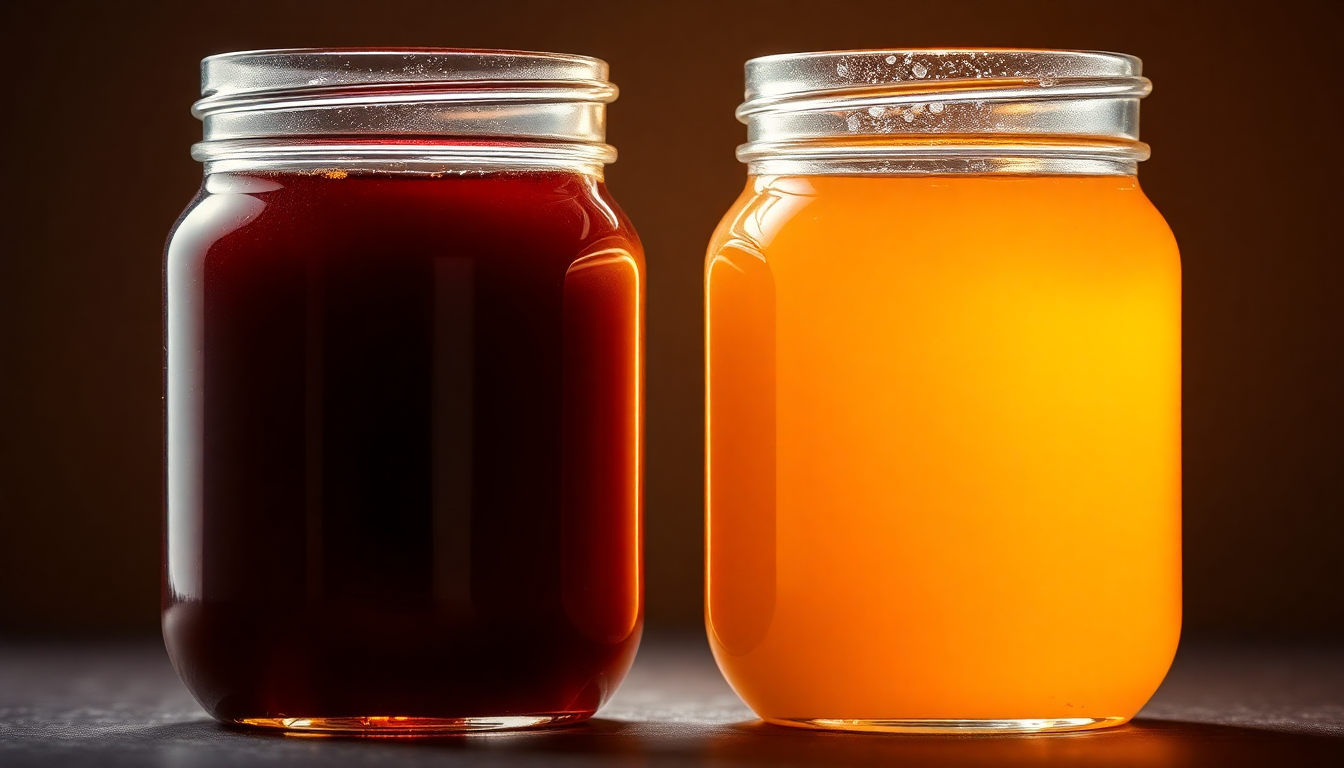
Dark Honey or Light Honey? Which is Better
Honey is a natural sweetener that has been enjoyed for centuries, and it comes in a wide variety of colors and flavors. From the deep, rich hues of dark honey to the delicate, golden tones of light honey, each type offers its own unique characteristics and benefits. As a passionate beekeeper and owner of Hidden Hollow Honey, I'm often asked which honey is better - dark or light? In this blog post, we'll explore the differences between these two honey varieties and help you decide which one might be the best fit for your taste buds and health needs.
Understanding Honey Colors
The color of honey is primarily determined by the types of flowers the bees visit to collect nectar. Honey that is made from the nectar of darker-colored flowers, such as buckwheat or wildflower, tends to be darker in color. On the other hand, honey made from the nectar of lighter-colored flowers, like clover or alfalfa, is typically lighter in color.
The season in which the honey is harvested can also play a role in its color. For example, early-season honey is often lighter in color, while late-season honey may be darker due to the changing floral sources available to the bees. This seasonal variation in honey color is one of the things that makes each batch unique and special.
Dark Honey
Dark honey, such as buckwheat or wildflower, is known for its rich, robust flavor and deep color. These honeys often have a slightly earthy or molasses-like taste, with notes of caramel or even a hint of bitterness. Dark honey is also typically thicker in consistency than its lighter counterparts.
In terms of health benefits, dark honey is often touted for its higher antioxidant content. The darker the honey, the more antioxidants it typically contains, which can help to support overall health and well-being. Dark honey has also been linked to potential anti-inflammatory properties and may even have some antimicrobial effects.
Some common types of dark honey include:
- Buckwheat Honey: A bold, robust honey with a distinct, almost nutty flavor.
- Wildflower Honey: A complex, floral honey that can vary in color and taste depending on the local wildflowers.
- Chestnut Honey: A deep, rich honey with a slightly bitter, almost smoky taste.
Light Honey
Light honey, such as clover or alfalfa honey, is known for its delicate, subtle flavor and pale golden color. These honeys are often described as having a more delicate, floral taste, with notes of sweetness and a lighter, more liquid consistency.
While light honey may not have the same level of antioxidants as its darker counterparts, it still offers a range of health benefits. Light honey is often considered easier to digest and may be a better choice for those with sensitive stomachs or who are looking for a milder honey flavor.
Some common types of light honey include:
- Clover Honey: A light, mild-tasting honey with a slightly sweet, floral flavor.
- Alfalfa Honey: A light, delicate honey with a subtle, grassy taste.
- Sage Honey: A light, fragrant honey with a slightly minty, herbal flavor.
Comparing Dark and Light Honey
When it comes to the debate between dark and light honey, there is no clear-cut winner. The choice ultimately comes down to personal preference and the specific use you have in mind for the honey.
In terms of flavor, dark honey is often described as more robust and intense, while light honey is more delicate and subtle. This can make a difference in how you use the honey - dark honey may be better suited for baking or adding to savory dishes, while light honey may be a better choice for sweetening tea or drizzling over yogurt.
Nutritionally, both dark and light honey offer a range of health benefits, including antioxidants, antimicrobial properties, and potential anti-inflammatory effects. However, the specific nutrient profile can vary depending on the floral sources and the honey's processing methods.
Which is Better?
When it comes to deciding between dark and light honey, there is no one-size-fits-all answer. It ultimately comes down to your personal taste preferences and the specific ways you plan to use the honey.
If you enjoy bold, robust flavors and are looking for a honey with a higher antioxidant content, then dark honey may be the better choice for you. On the other hand, if you prefer a more delicate, subtle flavor and are looking for a honey that is easy to digest, then light honey may be the way to go.
The best approach is to try both dark and light honey and see which one you enjoy the most. At Hidden Hollow Honey, we offer a wide variety of honey types, so you can explore the different flavors and find the one that's perfect for your taste buds and your health needs.
So, whether you're a fan of the deep, rich notes of dark honey or the delicate, floral tones of light honey, there's a honey out there that's sure to delight your senses and nourish your body. Happy tasting!

Leave a comment